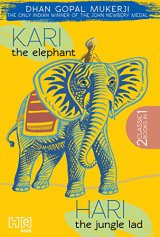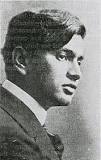Kari the Elephant Page #11
A nine-year-old boy raises and trains Kari the elephant, learning about the law of the jungle and the intelligence and the dignity of elephants.
Knowing this power of music over animals, I wanted to train Kari and Kopee to follow the tunes of my flute. Kopee was such a monkey that I could not make him listen. Whenever I began to play the flute, he would go to sleep or run up a tree. Monkeys have no brains. Kari, on the contrary, though much worse at first, was more sensible. He paid no attention to any tune that I played, but once in a while, I would strike a note that would make him stop still and listen, and I could tell by his manner that this tune went home. Those long fanning ears of his would stop waving and the restless trunk would be still for a moment. Unfortunately, the notes that really reached his soul were very few--I could hardly sustain them for more than a minute and a half. Weeks passed before I could get them back again. One day after the battle with the wild elephant in the jungle, I took up the flute again and began to play for him. I tried many notes and chords. At last I could sustain the tones he liked for more than three minutes. By the end of August, I could make Kari listen to my music for ten minutes at a time. When another winter had passed and summer came again, I could really command him with my music. I could sit on his back, almost on his neck, and play the flute, never saying a word, and guide him for days and days. This summer a very daring tiger visited our village. His head looked like a tower and his body was as large as that of an ox. At first he came in the night and killed oxen or buffaloes, but one night he killed a man, and after that he never killed anything but men, for the tiger is as fond of human meat as we are of chicken. Our house was very near the jungle; all our windows were barred with iron. Nothing could go in or out through them except mosquitoes or flies. One evening I was sitting at my window at about eight o'clock. I heard the cry of the Fayu, the fox which goes ahead of the tiger, giving the warning call to all the other animals. Then, as the darkness that night was not very intense, I could see the fox go by. Soon I could actually inhale the odor of a tiger. In a few moments an enormous black creature came and stood in front of the window. As he sat down, the call of the fox in the distance stopped. After a while the tiger stood up and walked toward the window. That instant, the fox in the distance began to call. I was very frightened, but as I wanted to see the tiger clearly, I lit a match. He was so frightened by the sight of fire that with one growl he bounded off. After that the tiger took to coming early in the afternoons. One day about four o'clock, we saw him standing on a rock across the river, looking at the village. The river was very shallow, hardly five inches deep, but it was very broad and full of sand bars. He stood looking at the village and growling with great joy. In India the government does not allow the people to carry rifles of any sort, so whenever a tiger or a leopard makes a nuisance of himself around the village you generally have to send for a British official to come and kill him. Word was sent to the magistrate of our district. In a few days a chubby-faced Englishman appeared. In the Indian sun the red face of the Westerner looks even redder. There are certain rules by which men hunt in India. You never shoot an animal weaker than yourself, and if you want to shoot a tiger or a leopard, you give it a warning. If you do not do so, you generally pay for it. After the British official appeared, I was allowed to take him on my elephant and go out in the open to show him that Kari was fit for hunting. He fired a number of shots and killed several birds. Kari, who had never heard a shot before, and whom everyone expected to be frightened, did not pay the slightest attention to all the clamor of flying bullets. He knew at heart he was the master of the jungle, and hence nothing could surprise him. It is said in India that the mark of a gentleman is that he is never surprised. That shows that Kari's ancestors were undoubtedly very gentle elephants. After killing some more birds, the magistrate became quite convinced that Kari would do for the hunt, so one morning about four o'clock we started out. I sat almost on the neck of my elephant playing my flute, and the magistrate sat in the howdah which had been especially prepared for him, since he was not accustomed to riding elephants any other way. We crossed the river and went far into the jungle. Beaters had gone ahead in large groups to stir up the jungle from all directions. It was very difficult to go through the jungle with the howdah on the elephant's back, and we had to edge our way along between branches and trees. After riding for at least two hours, we came to an open space and it was agreed that the beaters should drive all the animals to this clearing. This morning the sunrise was full of noise and without any of the soft and delicate silences which usually mark day-break in the jungle. I felt quite out of humor and apparently Kari was bored to death. He kept on pulling at one twig after another with his trunk, nibbling and wasting everything. Our passenger did not know any language but English, and as I knew nothing of English at that time, we spoke very little and only by signs. The first animals to come before us were a herd of antelopes which dashed towards us like burnt gold flashing through emerald water. After they had passed, a lull fell on the scene, which was soon broken by the grunt and snort of a rhinoceros. He rushed forward in a straight line, as usual, breaking and tearing everything. Kari averted his gaze because elephants are always irritated by the ostentatious bustle of a rhinoceros. Then, soon after him we saw a horned boar rushing like a black javelin through the air, followed by many animals, weasels and wild cats, and once in a while a cheetah with its spotted skin. They refused to come out in the open, however, but always went behind the screen of foliage and grass, for they had smelled the danger signal, man and elephant. Every little while we heard a passionate and angry growl. When this sound reached our ears, the magistrate would sit up with his rifle to take aim. Then there would be a lull. Now we could hear the cry of the beaters in the distance coming nearer and nearer. Suddenly a herd of elephants passed. They made no noise and left no trace, but passed by like walking cathedrals. Again the angry growl fell on the jungle, but this time it was ahead of us. The beaters cried out again close by, but all were silenced by the roar of the approaching tiger. With one bound he appeared in the clearing, but immediately disappeared again. We could see him passing from one bush to another; and when he stopped we caught a glimpse of his hind legs. Without any warning the magistrate fired and like a thunder bolt, the tiger leaped in front of the elephant with one roar. Kari reared; he walked backwards and stood with his back against a tree. The magistrate could not shoot at the tiger without sending a bullet through my head, so he had to wait.
Translation
Translate and read this book in other languages:
Select another language:
- - Select -
- 简体中文 (Chinese - Simplified)
- 繁體中文 (Chinese - Traditional)
- Español (Spanish)
- Esperanto (Esperanto)
- 日本語 (Japanese)
- Português (Portuguese)
- Deutsch (German)
- العربية (Arabic)
- Français (French)
- Русский (Russian)
- ಕನ್ನಡ (Kannada)
- 한국어 (Korean)
- עברית (Hebrew)
- Gaeilge (Irish)
- Українська (Ukrainian)
- اردو (Urdu)
- Magyar (Hungarian)
- मानक हिन्दी (Hindi)
- Indonesia (Indonesian)
- Italiano (Italian)
- தமிழ் (Tamil)
- Türkçe (Turkish)
- తెలుగు (Telugu)
- ภาษาไทย (Thai)
- Tiếng Việt (Vietnamese)
- Čeština (Czech)
- Polski (Polish)
- Bahasa Indonesia (Indonesian)
- Românește (Romanian)
- Nederlands (Dutch)
- Ελληνικά (Greek)
- Latinum (Latin)
- Svenska (Swedish)
- Dansk (Danish)
- Suomi (Finnish)
- فارسی (Persian)
- ייִדיש (Yiddish)
- հայերեն (Armenian)
- Norsk (Norwegian)
- English (English)
Citation
Use the citation below to add this book to your bibliography:
Style:MLAChicagoAPA
"Kari the Elephant Books." Literature.com. STANDS4 LLC, 2025. Web. 10 Mar. 2025. <https://www.literature.com/book/kari_the_elephant_392>.








Discuss this Kari the Elephant book with the community:
Report Comment
We're doing our best to make sure our content is useful, accurate and safe.
If by any chance you spot an inappropriate comment while navigating through our website please use this form to let us know, and we'll take care of it shortly.
Attachment
You need to be logged in to favorite.
Log In